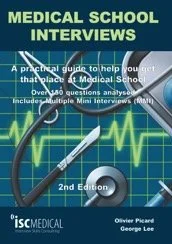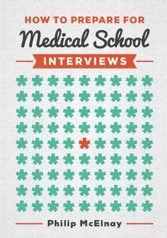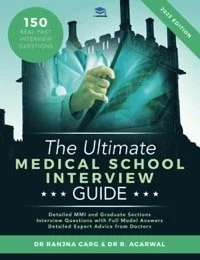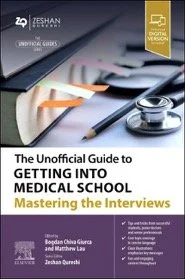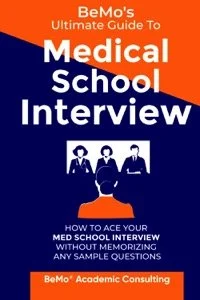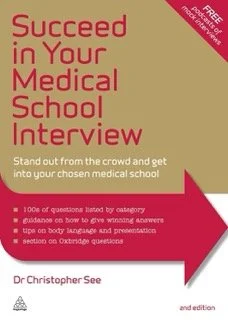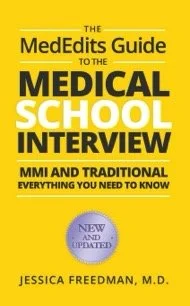Best Medical School Interview Books: Reviews, Pros and Cons for UK Applicants
Preparing for your medical school interview is a crucial step on your journey to becoming a doctor. Many students turn to medical school interview books as a revision tool. In this guide, we’ll explore the pros and cons of using books in isolation versus combining them with an interview course, review some popular interview prep books (with feedback from students), and discuss why supplementing books with interactive preparation – like an interview course or MMI mock circuit – can give you an edge. This guide is written in a formal yet friendly tone, aimed at sixth-form students in the UK, and packed with tips to help you excel in your interviews. Please note that the opinions on this page are those of internet users and not of Blue Peanut’s team.
Pros and Cons of Using Books for Interview Prep
Pros: Books can be a convenient starting point for interview preparation. A good interview guidebook compiles common questions, offers model answers, and outlines strategies for tackling tricky topics (e.g. medical ethics, NHS hot topics). They allow you to study at your own pace and revisit information as needed. Many students find that books give them a broad overview of what to expect. For example, one highly-rated guide boasts “over 150 common interview questions, covering a range of topics… with tried and tested tips to ace the interview, communication techniques, and key information about NHS structure, medical ethics and more.” Using such a book helped one medical student “strengthen areas I felt less confident in” by providing “great insights into common MMI questions”, which he found to be “a huge help.” Books are also cost-effective compared to courses, and you can easily mark them up with your own notes.
Cons: On the downside, relying on books in isolation has some limitations. First, books can become out-of-date – medicine and NHS policies evolve, and a guide published even a few years ago may not reflect the latest issues or interview formats. (One student on a forum noted that a popular interview book felt “a bit dated,” wondering if it was still worth it). While many publishers release new editions every few years to update content, you should double-check that you have the latest edition.
Secondly, books are static resources – they can’t adapt to you or give personalised feedback. Reading about how to answer questions is one thing, but practising aloud is another. Without real-time feedback or interaction, you might not notice if your answers sound unnatural or if you’re struggling with timing. This is especially relevant for Multiple Mini Interviews (MMIs), which are timed and interactive by nature.
Finally, there’s a risk of sounding over-rehearsed if you memorise book answers word-for-word. Interviews are meant to be conversational, and admissions tutors value authentic, unrehearsed responses. Official advice from medical schools is “don’t learn answers word for word” – it’s important to be familiar with common questions, but not to recite canned responses. As one guide warns, “avoid memorising answers word-for-word, as it can come across as rehearsed… you want to sound engaged and natural, not robotic.” Remember, the interviewers are interested in your thought process and personality, not your ability to regurgitate a book. In short, books are useful for building knowledge and confidence, but they should be used as a supplement rather than your sole preparation method.
Why Combine Books with an Interview Course?
Given the limitations above, many successful applicants use books alongside more interactive preparation. Enrolling in a structured medical school interview course can address the gaps left by solo book study.
Interactive practice: A course or workshop provides mock interviews, sometimes in the exact format (MMI or panel) you’ll face. This kind of practice is invaluable – as one med student put it, “Mock interviews and the feedback you get from them are gold dust, nothing can compare… you have to experience an MMI before going for your first one!”. Books can list sample questions, but a live practice session can simulate the pressure and spontaneity of a real interview and help you improve your communication skills on the spot.
Personalised feedback: Working with experienced tutors or interviewers means you get tailored critiques of your answers – something no book can provide. You’ll learn what you’re doing well and what needs work (maybe you’re speaking too fast, or not structuring your answers clearly). A good course will also teach you frameworks to approach unseen questions, which is hard to master from a book alone. For instance, Blue Peanut’s course instructors can show you how to structure an ethical dilemma response or break down a clinical scenario, then let you practice doing it yourself with guidance.
Up-to-date insights: Interview courses run by professionals are constantly updated with the latest trends in medical admissions. They can brief you on current hot topics in healthcare or any new interview stations that have appeared in recent years. Books may lag in this respect, whereas a course tutor might say, “This year, a lot of schools are asking about AI in medicine,” and ensure you’re ready to discuss it. Courses also often draw on real questions used at specific schools. (In fact, one popular book was written by tutors who compiled questions from MMIs at 25 UK medical schools – the kind of insider knowledge you’d also get by interacting with tutors directly.)
Confidence and communication: Lastly, a course builds your confidence in a way that self-study cannot. It forces you to articulate your answers out loud, deal with nerves, and adapt to curveball questions – all in a supportive environment. You’ll also pick up little things that books don’t emphasise enough, like body language, tone of voice, and thinking on your feet. These soft skills are much better honed through practice and feedback. It’s no surprise that many students report feeling far more prepared after attending an interview workshop or MMI mock circuit, in addition to reading guides.
In summary, combining book study with interactive preparation (be it a formal course, school-run mock interviews, or even practice with friends/family) is often the winning formula. You’ll gain knowledge from books and polish your delivery through practice. As one team aptly concludes, “there is no right or wrong way to prepare… these books will not make or break your chances of admission as much as they may improve your skill-set.” The key is to use every tool at your disposal: read, reflect, discuss, and practice – so you walk into your interview confident, up-to-date, and ready for anything.
Top Medical School Interview Books (with Student Feedback)
What books do applicants swear by? Over the years, a few classic titles have become go-to resources for UK medical school hopefuls. Below, we list some of the most popular interview books and summarise online feedback about each one. (Remember to use these as guides, not scripts – and consider pairing them with other prep as discussed.)
1. Medical School Interviews (Olivier Picard & George Lee) – ISC Medical
Often dubbed “the ISC book,” Medical School Interviews: A Practical Guide to Help You Get That Place at Medical School is arguably the best-known interview book in the UK. It’s a comprehensive guide covering 150+ common questions, with a detailed analysis of what makes a good answer. Topics range from classic queries like “Why Medicine?” to ethical dilemmas and quirky abstract questions. The book doesn’t just give sample answers – it teaches techniques for structuring responses and avoiding pitfalls. Many students praise it for its depth and breadth. In fact, it’s a bestseller that has been widely used for over a decade (first published in 2006, with a 2nd edition update later). Importantly, new editions have incorporated Multiple Mini Interview scenarios as MMIs became popular, and the publishers have updated content every few years.
Positive feedback: Students often comment that this book boosted their confidence and preparation. One reviewer noted it has “lots of questions and great model answers!!”. Another reader gave it 5 stars for being “helpful,” saying it “provides great insights into common MMI questions” and was a “huge help” in strengthening weaker topic areas. There’s consensus that the book is thorough and well-written. The British Medical Association even highly commended it in their book awards, with judges praising its comprehensive coverage: “The book is thorough and well written. It has many good questions and challenging scenarios and will allow candidates to prepare thoroughly for their interview… the quality of the questions and answers and the variety is satisfying to see.” Such endorsements speak to its authority.
Users also appreciate that the answers aren’t meant to be memorised but to show what a strong response looks like. As one medical student pointed out, he used this book to get an idea of points he “hadn’t considered” for certain question types, then thought about how he’d answer in his own words. Another reviewer remarked that “most of the interview questions are similar every year, and I would fully expect this book to be useful for 2-5 years after being published… There are a lot of garbage books out there... This is not one of them. Recommended.” This indicates that even if some material dates slightly, the core question bank and advice remain relevant and high-quality.
Critiques: The main caution with the ISC book is not to over-rely on it. Some students feel that the sample answers can be too structured or formulaic if parroted exactly. “Do you guys think [this] book is too structured? … it focuses on getting the right structure and points within paragraphs and seems a bit over-rehearsed,” one student asked on a forum. The consensus was to use the book for ideas and to understand what makes a good answer, but then personalise your responses. “I used it to give me a general idea… then I think about it in my own mind,” replied one successful applicant. This book provides an excellent foundation, but you must add your own voice to avoid sounding like “just another Picard-and-Lee clone.” Also, a few readers have pointed out that some content (like all pronouns being “he” for doctors) feels a bit outdated or not fully inclusive – a minor issue, but it reflects that parts of the text haven’t been modernised in tone. Overall, Medical School Interviews remains a top recommendation for its thoroughness; remember to use it as a guide, not a script.
2. How to Prepare for Medical School Interviews (Philip McElnay)
This is a more recent entrant (first published in 2016 by Scion Publishing) and quickly became popular, especially after winning praise in the medical education community. Dr. Philip McElnay’s How to Prepare for Medical School Interviews is often lauded for its extensive collection of 200+ practice questions covering both traditional and MMI formats. It’s organised by topic (motivation for medicine, ethical scenarios, NHS knowledge, personal insight, etc.), which makes it easy to target your weaker areas. The book also offers practical advice on interview technique and mindset.
Positive feedback: Notably, this book was “HIGHLY COMMENDED in the 2017 BMA Book Awards,” a mark of quality. The BMA judges’ comments were glowing: “The book is thorough and well written. It has many good questions and challenging scenarios, and will allow candidates to prepare thoroughly for their interview. This is a useful book with plenty of scenarios for medical school applicants to practise and prepare. I am not aware of any other books in this subject area that describe potential interview questions to such depth.”. Such an endorsement suggests that McElnay’s guide set a new bar for depth of content – it was praised for the quality and variety of its questions and model answers.
Students who have used this book often cite its realistic scenarios and clear explanations. Because it was written by a junior doctor (and academic surgical trainee) with input from medical students around the UK, the content feels very attuned to what actual interviews ask. One Amazon reviewer mentioned that the ethical questions in this book were especially strong and worth paying attention to, saying they “found these to be very good”. The book’s tone is supportive – it doesn’t just dump questions on you, it coaches you on how to approach them confidently.
Critiques: There are fewer criticisms of McElnay’s book floating around forums, partly because it’s a bit newer and perhaps less ubiquitous than the Picard & Lee book. One might be that, by now (a few years on), some of its content, like NHS structure or hot topics, could use updating – always check if a newer edition or reprint is available. (The latest edition is from 2016, so for instance it won’t mention the COVID-19 pandemic or very recent medical developments, whereas interviewers might.) However, the core question frameworks (ethics principles, classic personal questions, etc.) remain relevant. Another “con” is simply that, like any book, it’s text-based and requires discipline to work through. It’s a dense 250+ pages of Q&A. Some students might find it overwhelming to read cover-to-cover – but you don’t have to. An innovative approach is to use the index to practice sections you’re less confident in (e.g. if you feel weak on policy or ethics, focus on those chapters). Overall, How to Prepare for Medical School Interviews has a strong reputation for quality, and many candidates credit it for helping them secure offers (often in combination with other prep). It’s a great choice if you want a one-stop question bank with authoritative guidance – make sure to supplement it by keeping up on current NHS issues (as any static book can become dated on those specifics).
3. The Ultimate Medical School Interview Guide (Rohan Agarwal & Dr. Ranjna Garg)
This guide, published by UniAdmissions, has quickly become another staple for interview prep since its first edition (around 2016; with updated editions in 2019 and 2022). The Ultimate Medical School Interview Guide markets itself as an all-in-one resource: it contains 150+ commonly asked interview questions with fully worked example answers, including a dedicated section on MMI stations and even Oxbridge-specific interview advice. What sets this book apart is that the authors are from an Oxbridge admissions background, and they compiled questions actually used at 25 UK medical schools’ interviews. In other words, it’s grounded in real-life interview experiences across the country.
Positive feedback: Students often praise The Ultimate Medical School Interview Guide for its clarity and practical tips. It covers not just what the answers might be, but also why and how – training you to think like an interviewer. One reviewer noted that the ethical scenario coverage was excellent, highlighting that section as particularly helpful. This aligns with another review, which said this book is “a particularly good source of information surrounding medical ethics in the NHS.” The guide is also well-rated on platforms like Amazon (around 4.4/5 stars from readers) and Goodreads. Users like that the answers provided are “fully worked,” meaning they break down the thought process. For a candidate who has no idea how to approach, say, a question about healthcare priorities or an abstract question about teamwork, this book’s answers serve as a strong tutorial.
Another benefit is that Agarwal and Garg cover common pitfalls and give “dos and don’ts” alongside the Q&A. For Oxbridge applicants, there’s added value in the section about the unique interview style there (e.g. tackling problem-solving questions). If you’re aiming for Cambridge or Oxford medicine, this guide’s insights can be especially helpful.
Critiques: While widely appreciated, some readers mention that the language in this book can be too advanced or verbose in parts – likely reflecting the authors’ academic background. If you prefer very straightforward, conversational explanations, you might find this guide a bit dense at times. However, you can certainly adapt the material; you don’t need to answer exactly as written (and indeed shouldn’t, to sound like yourself). Content-wise, it’s pretty comprehensive. Do keep in mind, as one Amazon reviewer wisely said: “As with any book, it cannot [do everything for you].” Use the Ultimate Guide to learn and practice, but still engage in live practice. No book can simulate an interviewer’s follow-up questions or the pressure of thinking on your feet.
In summary, The Ultimate Medical School Interview Guide is a handy resource, especially for its authentic questions from various med schools and its strong section on ethics and MMI scenarios. It’s often used alongside other books or courses, and many students have found success with its help.. If you’re the kind of learner who likes to see fully fleshed answer examples and dissect them, this book will suit you well.
4. The Unofficial Guide to Getting Into Medical School: Mastering the Interviews (Medefine Education / UGTM)
The “Unofficial Guide to Getting Into Medical School” series has gained popularity in recent years, and Mastering the Interviews is its dedicated interview handbook (released as a separate volume). This book takes a somewhat different approach than a straightforward Q&A list. It is written in conjunction with Medefine Education (a team focusing on widening access to medicine). It features contributions from dozens of medical students and recently successful applicants sharing their tips and experiences. In fact, note that over 300 medical students across 30+ UK medical schools contributed advice to this guide. The result is a comprehensive, “fresh” take on interview prep that covers core themes, provides practice scenarios, and offers peer-to-peer advice.
Positive feedback: The Unofficial Guide has been lauded by multiple medical school deans for its quality. That kind of endorsement suggests the book’s content and approach are well-aligned with what medical schools are looking for. Instead of just giving you questions and answers, it focuses on themes and frameworks. For example, it guides you through common interview topic areas (motivation, ethics, teamwork, etc.), explains what interviewers typically want to see in those areas (often providing the marking criteria or traits being assessed), and then gives sample questions with guidance on how to tackle them. A unique feature is the inclusion of peer tips – little nuggets like “how I approached my work experience questions” or “what I said when asked about failure,” directly from successful students. This can be very encouraging and offers multiple perspectives (since there’s no single “right answer” to most interview questions).
Because it’s a newer publication (the latest edition slated for late 2025), specific “reviews” from students might be fewer, but early feedback is positive. Students appreciate the engaging style – it’s said to be a clear and “fun and engaging” read, not dry or overly formal. The active learning approach (encouraging you to practice with friends, providing marking schemes for mock interviews, etc.) has been highlighted as a plus. In other words, this guide doesn’t want you to just read it; it wants you to interact with it and actually rehearse. That’s a smart approach aligned with educational best practices.
Critiques: One could argue that since this book tries to cover “every aspect of the application process, including MMIs”, it might not go into extreme detail on each and every interview question type compared to a dedicated Q&A bank like the ISC or McElnay books. It’s broad-ranging. If you’re someone who just wants 300 question-answer pairs to drill, this guide’s style of narrative explanation and activities might feel less direct. However, it still includes plenty of sample questions and scenarios – they’re just integrated into the text rather than listed in endless bullet points. Another potential downside is simply the timing: if you’re interviewing in 2025 or 2026, ensure you get the most current edition of this book. The field evolves, and the Unofficial Guide’s strength is its up-to-dateness and community input, so an updated edition is worth seeking out (the newest edition is expected in late 2025, as a follow-up to the earlier combined application guide).
All told, The Unofficial Guide to Getting Into Medical School: Mastering the Interviews is an excellent resource for those who want a modern, student-led perspective in their preparation. It complements the more traditional Q&A books by covering strategy and providing encouragement. Many students use it in tandem with a question bank book – for example, reading the Unofficial Guide to grasp what interviewers want and how to structure answers, then using another book or question list to practice more questions. Given its endorsement by deans and wide input, it’s a reliable and inspiring guide to include in your prep arsenal.
Other Notable Mentions: There are certainly other interview prep books (especially in North America, titles like The Medical School Interview by Dr Jessica Freedman, or BeMo’s Ultimate Guide to Medical School Interviews). However, those are tailored to the U.S./Canadian context. For UK students, the four books above have been the most popular and relevant over recent years. An older title, Succeed in Your Medical School Interview by Dr. Christopher See, was used by some applicants in the 2010s, but newer books have largely superseded it with updated content. Always consider who the author is and how recent the publication is. And remember, no single book will guarantee you an offer – but each of these, used wisely, can certainly improve your performance.
Final Thoughts: Use Every Resource Wisely
Preparing for a medical school interview can feel daunting, but it’s also an opportunity to showcase your passion and personality. Books can play a valuable role in your prep by equipping you with knowledge of common questions, medical issues, and effective answering techniques. Many students have gained confidence by reading interview guides and practising the example questions. As we’ve seen, there are excellent books available, full of insights and even award-winning content.
However, books should not be your only method of preparation. Think of them as one tool in your toolkit. It’s crucial to stay updated on current medical news (medical school websites like Birmingham explicitly advise keeping abreast of NHS and health news in the media) and to practice speaking about those issues. Discuss scenarios with friends or mentors, engage in mock interviews, and seek feedback whenever possible. If you can, consider joining an interview course or an MMI workshop for that live practice – for example, Blue Peanut’s MMI mock circuits allow you to run through realistic stations with feedback, which can be immensely beneficial after you’ve done your book study.
In the end, combining resources is the best strategy. As one guide summed up, “Some students may find that a textbook with model answers is right up their alley, whilst others may benefit more from visual aids or personalised coaching… Ultimately, the key to success is to show self-reflection, dedication, strong communication skills and approachability. Regardless of how you prepare, know that books will not make or break your chances – they are there to ameliorate your skills.” In other words: use books to build knowledge and structure, use courses or practice to build experience and confidence, and focus on presenting the best genuine version of yourself.
Good luck with your preparation! With the right mix of study and practice, you’ll be well-equipped to turn those interviews into offers. Remember, the interviewers want you to succeed – they are looking for future colleagues who are empathetic, curious, and thoughtful. Use the resources available, stay true to your own motivations, and you’ll shine in your medical school interviews.
Keep pushing forward, and believe in yourself – you’ve got this!
Frequently Asked Questions About Medical School Interviews
1. What types of questions are commonly asked in UK medical school interviews?
Medical school interviews in the UK often include ethical scenarios, role-play questions, discussions about motivation for a career in medicine, NHS-related issues, and problem-solving tasks. You may also be asked about your work experience, teamwork, communication skills, empathy, and understanding of a doctor’s responsibilities. Reading medical school interview books that provide practice questions and model answers can help you prepare for these different question types.
2. How should I structure my responses to interview questions?
A strong answer should be clear, concise, and structured. Many successful applicants use frameworks such as STARR (Situation, Task, Action, Result, Reflection) or ABCDE (Answer, Back up, Consider alternatives, Draw together, Evaluate). These frameworks help you organise your thoughts and avoid rambling. The best medical school interview books often provide step-by-step strategies and example answers, showing you how to structure responses effectively.
3. Which interview formats should I prepare for?
UK medical schools use two main formats:
MMI (Multiple Mini Interviews): Short, station-based interviews where you rotate through different scenarios.
Traditional/Panel interviews: A more extended conversation with one or more interviewers.
Most schools now use MMIs, but some still include panel interviews. Good medical school interview guides will cover practice stations, common pitfalls, and insider tips for both formats, so you’re ready for any style of interview.
4. When do medical school interviews typically occur?
Medical school interviews in the UK typically take place between December and March, although some universities may extend the process into April. You’ll generally receive invitations shortly after UCAS applications are reviewed. Having a medical school interview book to hand well in advance allows you to practice gradually and build confidence ahead of time.



